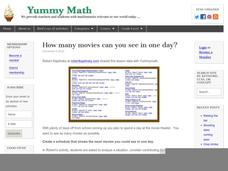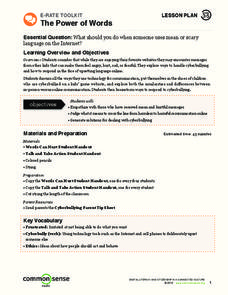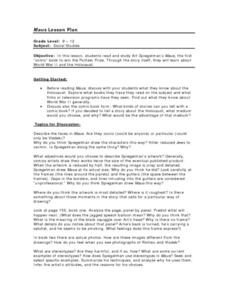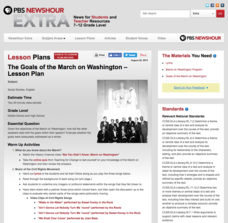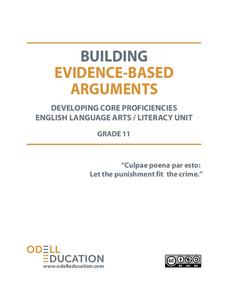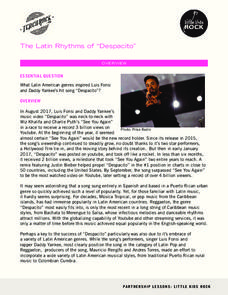Curated OER
What is Biotechnology?
Young consumers explore the concept of biotechnology as it pertains to the foods they eat, economics, and agriculture. They watch several videos, explore a website, complete worksheets, and engage in class discussion. Son they'll know...
Curated OER
How many movies can you see in one day?
For kids who love movies, figuring out a schedule for the maximum number that can be seen in one day is not only a good demonstration of Common Core mathematical practices, but also a highly motivating activity. Robert Kaplinsky...
Curated OER
Lesson Refresh: Plan with the END in Mind
Fourth graders identify literary techniques by participating in a class discussion. In this organization lesson, 4th graders practice public speaking while presenting ideas for a story to their classmates as well as critiquing the ideas...
Curated OER
Scapegoating and Othering
Scapegoating and "Othering" is the focus of a series of activities that ask groups to consider how these behaviors contribute to hatred and intolerance. Groups are given a scenario and discussion questions based on the situation. Whether...
Common Sense Media
The Power of Words
Give youngsters the tools to approach cyberbullying and hostile language on the Internet. This lesson plan includes a variety of handouts and worksheets that will prompt discussion and inquiry with your class members around harmful...
Curated OER
Maus Lesson Plan
The artistic choices Art Spiegelman made in his graphic novel, Maus, are the focus of an exercise that asks class members to compare classic comic book forms with Spiegelman’s panels and frames. Directed to specific pages and guided by a...
Curated OER
Fighting Fake News
Fake news. Alternative facts. Internet trolls. In an age of Newspeak, it's increasingly important to equip 21st century learners with the skills needed to determine the legitimacy of claims put forth on social media, in print, and in...
PBS
The Goals of the March on Washington
Who else had a dream other than Martin Luther King, Jr.? Pupils explore civil rights leaders in a fourth lesson out of a series of five about people who paved the way to freedom for African Americans. The inquiry-based unit has your...
Curated OER
Anansi and the Tug O' War
Read a short book with your first graders! Anansi and the Tug O' War is the focus of this lesson. After reading the African story together, they complete language arts activities to practice reading comprehension. A stellar group of...
Carolina K-12
What Should President Truman Do?
After reading the article Choices: Truman, Hirohito, and the Atomic Bomb, class members engage in a simulation, assume the role of President Truman or one of his advisors and discuss the options open to the president. The exercise...
Odell Education
Building Evidence-Based Arguments: "Cuplae poena par esto: Let the punishment fit the crime."
Should a criminal's punishment match the crime? An argumentative writing plan explores this question as class members investigate a variety of mixed-medium sources by experts in the field, form evidence-based claims, and support them...
US Environmental Protection Agency
Carbon Through the Seasons
Meteorologists view an animated video by the Environmental Protection Agency to learn how the carbon cycle works, and then move into groups to analyze and graph actual data of the atmospheric carbon dioxide concentration from Hawaii's...
Carolina K-12
Exploring the Electoral College
Does your vote really count? This activity helps young voters learn about the electoral college through a TED talk, a helpful handout, discussion prompts, and then a role-playing activity that has participants simulating an election on a...
University of Minnesota
Ethics of Dissection
There's an elephant in your classroom. That's right — a big, awkward elephant named Dissection. Sure, you'd like to talk about him ... but how? Whether you're a seasoned teacher or fresh out of student teaching, the topic of dissection...
Virginia Department of Education
Prokaryotes
Lead your biology class on a cell-sized adventure! Emerging scientists construct models of prokaryotes, then design an experiment to properly grow a bacterial culture. They conclude the activity by viewing the culture under a microscope....
Virginia Department of Education
The Particle Theory of Matter
Demonstrate the particle theory of matter to high school scientists with an engaging experiment that allows them to visually see the results as substances change from one state to another. The class concludes with a discussion about how...
Heritage Foundation
Procedural Rights: Amendments VI, VII, and VIII
Even in court, your class members have procedural rights provided by the amendments. Teach high schoolers this important lesson by using the 18th installment of a 20-part unit exploring the US Constitution. The resource provides several...
Curated OER
A Whale of Importance to the Arctic People
The bowhead whale of the Arctic region is of great importance to the people that live there. Your class will brainstorm all they know about this wonderful whale and create an informational video, which they will share with the children...
Community Resources for Science
A Whole New World of DNA and Proteins
Lead your young scientists into an exciting world as they participate in a role play and experiment focused on proteins and DNA. After researching the Central Dogma of Biology, individuals or groups participate in a classroom slide...
Louisiana Department of Education
Fahrenheit 451
In his 2013 introduction to Fahrenheit 451, Neil Gaiman states, “Fiction is a lie that tells us true things, over and over.” In this extraordinary unit plan, readers "explore the power of written language to educate and influence...
American Chemical Society
Protons, Neutrons, and Electrons
Atomic bombs harness the power in the nucleus of an atom, creating devastating power and damage. Classes review parts of an atom by charging a piece of plastic and holding it near their fingers, discussing what is happening and why....
Royal Society of Chemistry
Observing Chemical Changes—Microscale Chemistry
Want to add a wow factor to your current chemical changes lesson plan? Try a microscale experiment with colorful precipitates! Partnered learners conduct 10 single displacement reactions and record their observations.
Little Kids Rock
The Latin Rhythms of “Despacito”
When you hear the first few beats of "Despacito," the unrivaled Latin pop hit of 2017, you can't keep your feet from moving! A music analysis lesson plan examines the intoxicating hit by Luis Fonsi and Daddy Yankee and introduces the...
Core Knowledge Foundation
The Civil War
A unit focuses on the Civil War. Second graders follow along with an informational reading about the war—why it started, how it ended, and essential individuals such as Harriet Beecher Stow, Harriet Tubman, Abraham Lincoln, Ulisses, S....



